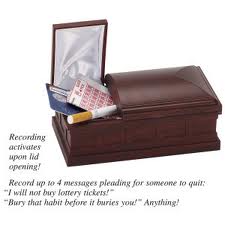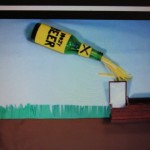A couple of weeks ago I spent a very entertaining Sunday evening at a church social that included an after dinner comedienne discussing the foibles of empty nesting. At the end of the presentation, the comedienne announced a trivia contest with prizes. She quickly cautioned us not to get excited and competitive since the prizes were regifts from her swag inventory. I was lucky enough to win a talking coffin.
 Apparently, our speaker had been hired to be a spokes woman for the product and was featured in a video called “Bury the Habit.” (www.burythehabit.com) As she describes the plastic coffin, about the size of a package of cigarettes, a pair of creamy white hands opens and closes the lid and gracefully points out other features, such as beveled edges and faux silk lining. When the lid is opened, a lugubrious voice coughs, hocks up a loogie and then calls out “quit before it is too late.” However, as the proud owner I could record up to 4 personal messages. There was also an animated video on the website, a very unsophisticated cartoon demo-ing the burial of different bad habits. In one scenario, a
Apparently, our speaker had been hired to be a spokes woman for the product and was featured in a video called “Bury the Habit.” (www.burythehabit.com) As she describes the plastic coffin, about the size of a package of cigarettes, a pair of creamy white hands opens and closes the lid and gracefully points out other features, such as beveled edges and faux silk lining. When the lid is opened, a lugubrious voice coughs, hocks up a loogie and then calls out “quit before it is too late.” However, as the proud owner I could record up to 4 personal messages. There was also an animated video on the website, a very unsophisticated cartoon demo-ing the burial of different bad habits. In one scenario, a  bottle of “boozy beer” is poured into the coffin which is then buried. The coffin then pushes up some daisies.
bottle of “boozy beer” is poured into the coffin which is then buried. The coffin then pushes up some daisies.
The website notes that “Bury the Habit” is a family enterprise, harnessing the talents of parents, children, aunts and uncles, contributing marketing, design, legal and financial expertise to “make a dream come true.” What kind of family has a dream of making a talking coffin? I envision thefollowing scenario:
A grandchild is anxious about his grandpa’s life long smoking habit, and his coffin shaped cigarette holder earns him a boy scout badge. Teary-eyed, he presents his gift to his grandpa, and lo and behold it works – after multiple failed attempts, Grandpa finally quits smoking.
The next Thanksgiving dinner turns into a brainstorming session on how to turn the kid’s simple idea into a money-maker, and perhaps Aunty Jill points out that the coffin would be more effective if it yelled at you every time you lifted the lid. She suggests the name “Bury the Habit,” and Nathaniel, Tony and Anne immediately come up with visuals. “If you were a snacker, you could fill the coffin with M&Ms,” says Nathaniel, “and my recording would be ‘Take that candy and put it back, only big fat pigs are allowed to snack.’
“You know what is really dangerous?” says Tony. “Driving while texting – let’s make the coffin big enough to fit a cell phone, and how about this message – ‘if you get distracted while you text, a head on collision will happen next.’”
“Here’s what I would like to bury,” says Anne. “I can’t stand it when Tony doesn’t put the toilet seat down. I would put my engagement ring in the coffin with the message, ‘If you don’t put the seat down after you piss, I’ll slam the lid on your wedded bliss.”
Old Uncle Tim, who has a particularly keen ear for well-crafted potty humor, thumps his hand on the table in appreciation, and stands up to make a toast, “Twenty years ago the Pet Rock swept the nation and a family just like us made a fortune. Now it is OUR TIME, it is OUR TIME with a product that can actually save lives. Let’s raise a toast to ‘Bury the Habit.’”
Enthusiasm continues to build as the family segues from turkey and yams to pecan pie, and responsibilities are divvied up. Tim and Jill are assigned background research on trademarks and patents, Tony and Anne agree to research manufacturing, particularly since their children Maggie and Libby travel frequently to China in their high school jazz band. Nick is assigned marketing and Bobbie is assigned legal issues, not because she has a law degree, but she tends to overthink things and that is the next best thing.
Ten months later, the product, priced at $19.95 (complete with batteries)is unleashed on an unsuspecting public, who have never before considered the charms of a talking coffin.
As I spend quality time withthe packaging, I notice a few oddities. The package feels compelled to state that the coffin is not suitable for “outdoor or underground use.” Perhaps the legal concern was that someone would be way too literal and stuff a dead parrot into the box and then bury it. I think that the package should also state that the coffin is not suitable for liquor, since some one might take the boozy beer cartoon seriously and short out the system. The package states the age range is “one until done,” but this seems to be a very defeatist attitude, since I interpret “done” to refer to a life span and not the habit. Additionally the claim, “Anything you do to quit is better than nothing,” is not a ringing endorsement. The statement, “Bury the Habit and save some bones!” is  inexplicable, but perhaps the family had to be vague in order to avoid making a specific health claim.
inexplicable, but perhaps the family had to be vague in order to avoid making a specific health claim.
Unsurprisingly, the coffin is made in China. I think of the Chinese worker, probably toiling away in an unfair trade job, cursing as he tests the petit recording device and tries to fit the faux silk lining into the coffin. What must he be thinking? America has always been a remote dream for him, a country representing freedom and unfettered choice, with ripe and rich opportunity, low hanging fruit ready for all the taking. With all of these great privileges, this is what Americans do – build and buy talking coffins?
But I think that I am missing the point here. This is exactly what Americans are good at – however cockamamie the idea, we are free to try spectacularly and fail miserably, and then do it again. Politicians are constantly yammering about jobs, jobs, jobs, so let’s take a look at the trickle down effect of “Bury the Habit.” Despite the family’s insistence that they did everything themselves, I bet they hired a business consultant to find a factory in China that was up to the job, a graphic designer for the packaging (I don’t think that they spent much money on this though), a lawyer to review the contracts, a web designer to create the website, and a videographer to film the product demo. The family then paid for a booth at several gift shows, and hired several unemployed friends to be the sales team, loading dozens of coffins in their car trunks so that they can drive around and call on gift stores. The family is planning to double their sales force around Halloween and Christmas and is now considering an infomercial where people can call an 800 number and order directly, with breathless “Wait, there’s more” offers of multiple coffins at a fraction of the price (plus shipping and handling). For the moment, the fulfillment house is in Tim’s garage where he is putting his teenage daughters to work, but ultimately he hopes to contract with a service. All in all, “Bury the Habit” has contributed to five different segments of the American economy.
Even though “Bury the Habit” is the bedrock of our economy, I am just not buying into the concept of a talking coffin. The package notes that it is a great gift, but I can’t imagine who I would give this to, unless I wanted to add a note of levity to an otherwise grim intervention. I also have my doubts that Bury the Habit can solve a pesky habit. I have seen a light activated device that you can put into your frig – every time the door opens, the device says something along the lines of, “No snacking, are you really that hungry? Shut the door and get your fat ass out of the kitchen!” Now that seems to have some chance of success – after all you do have to open the refrigerator door every now and then. However, I can see no reason that anyone would feel compelled to open a coffin to get yelled at. But I would love to be proven wrong and I wish the family the best of luck.
The missing words in the following poems are anagrams (i.e. share the same letters, like spot, post, stop) and the number of asterisks indicates the number of letters. One of the missing words will rhyme with the preceding or following line. Your job is to solve for the missing words based on the context of the poem and the above rules. Scroll down for answers.
Perhaps he is a snacker, a gambler, or a recidivist drug ****
Or maybe he leaves the toilet seat up, or is a habitual boozer.
He **** the day that he lost his self control and respect,
And let his habit turn into an addiction that has gone unchecked.
So the family tries a clever**** that they hope will work in a flash
It’s is a plastic coffin that talks customized trash,
They were **** it was going to work, but here is what the abuser did
He never heard the message because he never opened the lid.
Answers: user, rues, ruse, sure
Follow Liza Blue on:Share:
